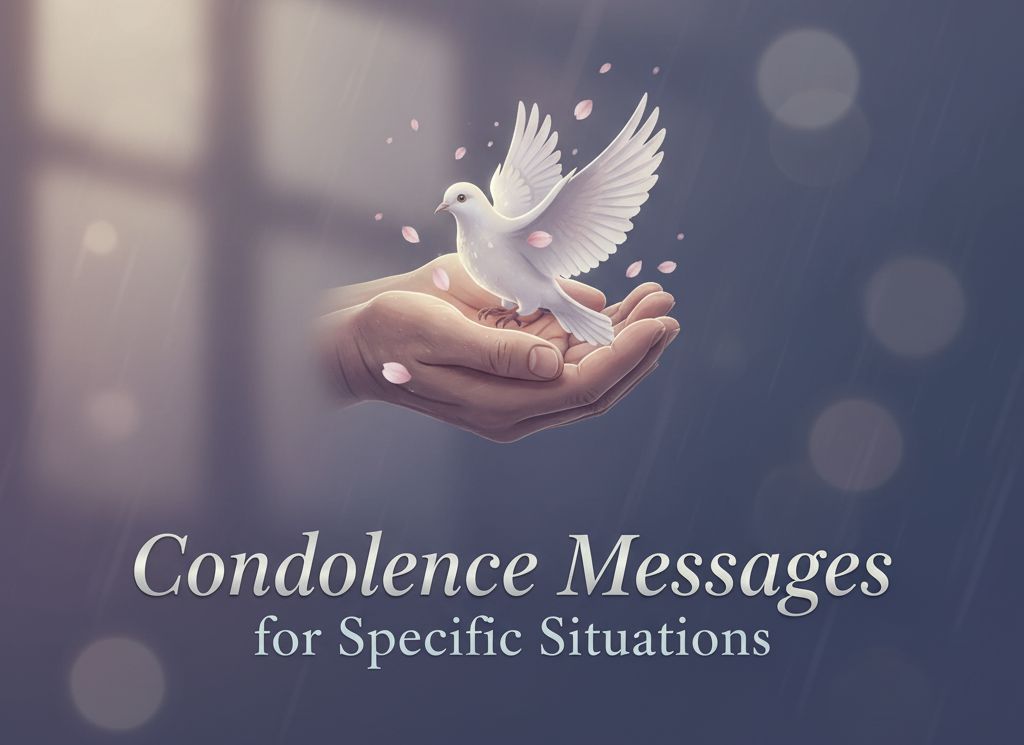Table of Contents
Short condolence message can bring deep comfort during life’s most difficult moments. Losing someone we love is never easy, and often, words seem inadequate to express the sorrow we feel. Yet, a few sincere and heartfelt lines can offer immense solace and healing. Whether shared through a note, text, or card, a short condolence message can gently remind someone grieving that they are not alone and that your thoughts and compassion are with them.
In this guide, we’ll explore the art of writing a short condolence message, examples to inspire you, and helpful tips to express compassion without overcomplicating your words.
Why Short Condolence Messages Matter
When someone faces a loss, they are often overwhelmed with emotions. Long, elaborate messages may be too much to process. A brief message—crafted with warmth and care—can say what lengthy words cannot.
A few simple sentences can:
- Offer emotional comfort and presence.
- Show that you care without intruding.
- Provide strength and reassurance in a difficult moment.
- Be remembered for their sincerity and timing.
Sometimes, it’s not about the length of your message but the feeling behind it. People remember empathy more than eloquence.
How to Write a Short Condolence Message
Writing a Short condolence message is never easy. You may fear saying the wrong thing or sounding insincere. However, following these principles can help you write from the heart:
1. Keep It Simple
Avoid overthinking your words. Speak naturally, as you would in person. Short and clear messages often sound the most genuine.
2. Be Empathetic
Show understanding of their pain without trying to fix it. Phrases like “I can’t imagine how hard this must be” show compassion without assumption.
3. Focus on Support
Instead of focusing on the loss itself, focus on comfort and presence: “I’m here for you,” or “You’re in my thoughts.”
4. Avoid Clichés
Phrases like “They’re in a better place” or “Time heals all wounds” can sometimes feel distant. Personal, genuine words are far more healing.
5. Use Their Loved One’s Name
Mentioning the name of the deceased shows you remember and honor their life. It brings a personal touch to your condolence.
Short Condolence Message Examples
Below are 10 heartfelt short condolence messages that convey love, empathy, and care:
- “My heart goes out to you during this difficult time.”
A timeless and gentle expression of sympathy. - “Thinking of you and wishing you peace and comfort.”
Ideal for cards or text messages. - “I’m deeply sorry for your loss. You’re in my prayers.”
A warm, respectful way to offer condolences. - “Wishing you strength and love as you remember [Name].”
Personalizes the message while showing support. - “May the love around you help you through the days ahead.”
Perfect for those who need reassurance and calm. - “Sending you my deepest condolences and all my love.”
Simple but deeply comforting. - “Holding you close in my thoughts today and always.”
Expresses ongoing emotional support. - “Words can’t express my sorrow. I’m here for you always.”
Suitable for a close friend or family member. - “Your loved one’s memory will always live on.”
Gentle and uplifting. - “May you find peace in the love that surrounds you.”
A poetic and heartfelt message for any form of condolence.
Condolence Messages for Specific Situations

While short condolence messages work universally, some situations require a more tailored tone. Here are a few examples:
For a Friend
“I’m so sorry for your loss. You mean the world to me, and I’m here for you whenever you need.”
For a Colleague
“My sincerest condolences to you and your family. Thinking of you during this difficult time.”
For a Neighbor or Acquaintance
“I was deeply saddened to hear of your loss. Sending peace and strength your way.”
For a Family Member
“I’ll always cherish the memories we shared with [Name]. Their love will remain in our hearts forever.”
For an Online Message or Text
“Heartfelt condolences. Thinking of you today and always.”
What to Avoid in a Condolence Message
Even with the best intentions, some words may unintentionally hurt. Here’s what to avoid:
- Avoid judging emotions. Don’t say “Be strong” or “You’ll get over it soon.”
- Don’t compare losses. Each person’s grief is unique.
- Avoid excessive religious comments unless you’re sure they share the same faith.
- Skip clichés that might minimize the pain.
Instead, focus on presence, compassion, and sincerity. A single heartfelt line can speak louder than any formal statement.
Tips for Sending Condolence Messages
Whether it’s a handwritten note or a message sent online, here are a few etiquette tips:
- Timing matters: Send your message soon after hearing the news.
- Use a personal touch: Handwritten notes often feel more meaningful.
- Follow up: After a few weeks, a brief check-in can bring comfort.
- Pair with a small gesture: Flowers, food, or a simple visit can amplify the care behind your message.
Remember, condolence messages aren’t about perfect words—they’re about presence and support.
The Healing Power of Kind Words
Even the shortest condolence message can touch the deepest part of someone’s heart. In grief, people don’t remember fancy phrases—they remember the kindness and sincerity of those who reached out.
So when words fail, let empathy speak.
When silence feels heavy, let a few heartfelt lines bring light.
And when you don’t know what to say, simply saying “I’m here for you” may be enough.
Frequently Asked Questions (FAQs)
1. What should a short condolence message include?
It should include a sincere expression of sympathy, acknowledgment of the loss, and an offer of comfort or support. Simplicity and authenticity are key.
2. How long should a condolence message be?
A short condolence message usually ranges between one to three sentences. The goal is to express empathy without overwhelming the grieving person.
3. Is it okay to send a condolence message by text?
Yes, especially if it’s timely and heartfelt. Texts are perfectly acceptable today, but for close relationships, a call or handwritten note can feel more personal.
4. Can I use quotes in a condolence message?
Yes, but keep them brief and meaningful. Quotes about love, memory, and peace can enhance your message—just ensure they match the tone of the situation.
5. What if I don’t know what to say?
When words fail, honesty is the best policy. You can simply write, “I’m so sorry. I don’t have the right words, but I care deeply and I’m here for you.”
Final Thoughts
A short condolence message doesn’t need to be poetic or perfect—it needs to be real. It’s about showing care, acknowledging loss, and reminding someone they’re not alone.
Whether it’s ten heartfelt words or two thoughtful sentences, your message can provide more comfort than you realize. The smallest gesture of sympathy often leaves the longest mark on a grieving heart.



